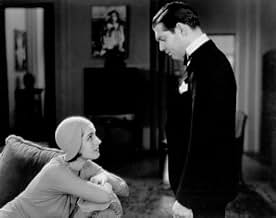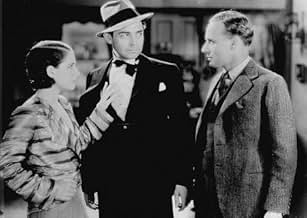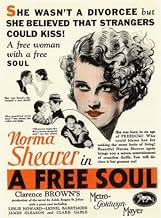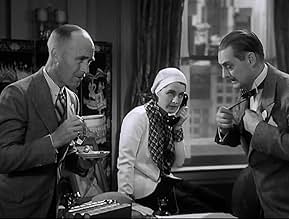AVALIAÇÃO DA IMDb
6,6/10
3,1 mil
SUA AVALIAÇÃO
Um advogado alcoólatra que defendeu com sucesso um jogador em uma acusação de homicídio objeta quando sua filha se envolve romanticamente com ele.Um advogado alcoólatra que defendeu com sucesso um jogador em uma acusação de homicídio objeta quando sua filha se envolve romanticamente com ele.Um advogado alcoólatra que defendeu com sucesso um jogador em uma acusação de homicídio objeta quando sua filha se envolve romanticamente com ele.
- Direção
- Roteiristas
- Artistas
- Ganhou 1 Oscar
- 4 vitórias e 2 indicações no total
Roscoe Ates
- Man Shot at in Men's Room
- (não creditado)
Ann Brody
- Hamburger Saleslady
- (não creditado)
Edward Brophy
- Slouch
- (não creditado)
Clarence Burton
- Detective
- (não creditado)
James Donlan
- Reporter
- (não creditado)
Bess Flowers
- Birthday Party Guest
- (não creditado)
Francis Ford
- Skid Row Drunk
- (não creditado)
Henry Hall
- Detective in Raid
- (não creditado)
George Irving
- Johnson - Defense Attorney
- (não creditado)
Edward LeSaint
- Judge
- (não creditado)
Eric Mayne
- Party Guest
- (não creditado)
Sam McDaniel
- Casino Valet
- (não creditado)
Avaliações em destaque
Johnny Cochrane must've learned some legal tricks from this old movie. For example, at the beginning of the movie, Lionel Barrymore gets Clark Gable acquitted of first degree murder when he places the hat found at the scene of the crime on Clark's head ... clearly the hat is too small. The court and jury laugh, and Clark is set free!
This entire movie was great -- much better than I had expected. I saw two Norma Shearer movies recently with a similar-sounding plot recap: Their Own Desire (Norma Shearer falls for the son of her father's illicit lover), and this one, A Free Soul (Norma Shearer falls for her lawyer father's mobster client). Having watched Their Own Desire first and not being impressed with it, I wondered if I should even bother with A Free Soul. But bother I did, and I'm glad for it. It was an excellent movie.
Lionel Barrymore is the black sheep of his snooty, well-heeled family. His wife died while giving birth to their only child, Jan (Norma Shearer). Being the black sheep, Lionel raised Norma to be a "free soul", to not be afraid of anyone or anything, to not be afraid to make mistakes, and to pick herself up and dust herself off whenever she did find herself in trouble. This has apparently worked well for Norma, until she meets and eventually tries to get away from Clark Gable. Norma finally learns there are consequences to all actions, that one can't be a "free soul" without it having some type of repercussion on one's life.
We also have Lionel Barrymore (whom I always love in anything I see him in) this time very compelling as a brilliant alcoholic lawyer who loves his daughter more than anything but who ultimately doesn't know how to protect her. He disappoints her, and he disappoints himself, but in the end he seeks to right his wrongs by defending Norma's ex-fiancé (to say more would be to possibly spoil the movie).
This movie was fresh, and the characters were sympathetically developed without ever resorting to being maudlin or melodramatic. This movie was also chock-full of great lines. For example:
(Lionel to Clark, upon learning Clark wants to marry Norma) - "The only time I hate democracy is when one of you mongrels forgets where you belong!"
(Norma to Clark, trying to get Clark to quit talking and make love to her) - "Men of action are better in action; they don't talk well."
Great early pre-code movie.
This entire movie was great -- much better than I had expected. I saw two Norma Shearer movies recently with a similar-sounding plot recap: Their Own Desire (Norma Shearer falls for the son of her father's illicit lover), and this one, A Free Soul (Norma Shearer falls for her lawyer father's mobster client). Having watched Their Own Desire first and not being impressed with it, I wondered if I should even bother with A Free Soul. But bother I did, and I'm glad for it. It was an excellent movie.
Lionel Barrymore is the black sheep of his snooty, well-heeled family. His wife died while giving birth to their only child, Jan (Norma Shearer). Being the black sheep, Lionel raised Norma to be a "free soul", to not be afraid of anyone or anything, to not be afraid to make mistakes, and to pick herself up and dust herself off whenever she did find herself in trouble. This has apparently worked well for Norma, until she meets and eventually tries to get away from Clark Gable. Norma finally learns there are consequences to all actions, that one can't be a "free soul" without it having some type of repercussion on one's life.
We also have Lionel Barrymore (whom I always love in anything I see him in) this time very compelling as a brilliant alcoholic lawyer who loves his daughter more than anything but who ultimately doesn't know how to protect her. He disappoints her, and he disappoints himself, but in the end he seeks to right his wrongs by defending Norma's ex-fiancé (to say more would be to possibly spoil the movie).
This movie was fresh, and the characters were sympathetically developed without ever resorting to being maudlin or melodramatic. This movie was also chock-full of great lines. For example:
(Lionel to Clark, upon learning Clark wants to marry Norma) - "The only time I hate democracy is when one of you mongrels forgets where you belong!"
(Norma to Clark, trying to get Clark to quit talking and make love to her) - "Men of action are better in action; they don't talk well."
Great early pre-code movie.
Having just seen the Free Soul (1931), I was struck with how much Gable's character foretold his similarly famous role as Rhett Buttler in the 1939 film, Gone with the Wind. The plot situations in the two movies were also very similar, a different time and setting. I noticed the role of the fathers were almost identical. Barrymore's patriarchal role was just as intense as Scarlet's father. Norma Shearer's free soul character was similar but more understandable and empathetic than Scarlet's continuous self-centeredness. The coincidence of the similarity of Leslie Howard's role in both films as the jilted lover was striking. His acting got a lot better in Gone with the Wind. It was easy to see how Gable was destined to be somebody based on his performance in the 1931 film. I found viewing A Free Soul while comparing it to the more famous Civil War movie was an enjoyable experience.
I thought A Free Soul an interesting exploration into the world of addiction--father Stephen Ashe, as played by Lionel Barrymore, struggles to balance his career as a defense lawyer and the disastrous effects his alcoholism has on his family and social life. Daughter Jan (Norma Shearer) has a similar problem--but her addiction is to a free and easy lifestyle, with no commitments and no responsibility. Both seem to be ways of dealing with an unspoken loss--perhaps that of a wife and mother. Again, as with all good storytelling, backstory is only hinted at but the characters are rich enough to imply a great deal of history. Refreshing to see Clark Gable as a suave, handsome but ultimately despicable character. A surprising lack of stereotypes for such a film-the Ashes are a patrician, proper family who virtually disown Stephen and his daughter, but they are shown to be intelligent, unique people none the less. A wonderful, melodramatic exploration of the relationship of a father and daughter. Some nice location work for an early talkie.
"A Free Soul" made Hollywood take notice of a young actor by the name of Clark Gable.Slapping leading lady Norma Shearer around,he portrayed masculinity like no star,with the exception of perhaps Jim my Cagney, had done before him.Lionel Barrymore won the Oscar for his very good performance of the alcoholic defense lawyer. I've always found him overacting his parts but he's very believable in this movie.Norma Shearer is also very good,but still overdoes the dramatics with her silent screen acting.But she's really a stunner in the quiet parts. Leslie Howard has once again one of his thankless parts which doesn't tax his ability at all.A very enjoyable picture.
To get an idea of how great magnetic and radiant shearer is here, consider that she matches her scenes with Clark Gable, lionel Barrymore and Leslie Howard and wipes the floor with all of them.
Don't get me wrong they are all very good here but this movie is a star vehicle for shearer and it is her movie. She does all of the shining.
If you appreciate her, this movie is a must see even though the film drags on and the script is average at best.
I wouldn't be surprised if this served as an inspiration to courtroom dramas like Perry Mason and Matlock later on.
Você sabia?
- CuriosidadesWhen the mule chases James Gleason, not a stuntman, is knocked down by the animal, a scene which wasn't planned, as Norma Shearer's reaction attests.
- Erros de gravaçãoAfter the cross-examination finishes, Stephen Ashe begins his summation to the jury. However, he is the defense attorney, and the prosecutor takes the first summation. This "factual mistake" is, in fact, not an absolute, as it depends on the state where the trial is held. For example, in a criminal case (which this is) in the Commonwealth of Pennsylvania, the defense goes first and the Commonwealth last. (If it were a civil case in PA, the Plaintiff would go first.)
- ConexõesFeatured in Some of the Best (1944)
- Trilhas sonorasBy the River Sainte Marie
(1931) (uncredited)
Music by Harry Warren
Played as background music during the restaurant scene
Principais escolhas
Faça login para avaliar e ver a lista de recomendações personalizadas
- How long is A Free Soul?Fornecido pela Alexa
Detalhes
- Data de lançamento
- País de origem
- Idioma
- Também conhecido como
- Un alma libre
- Locações de filme
- Yosemite National Park, Califórnia, EUA(Jan, her father and Eddie go camping)
- Empresa de produção
- Consulte mais créditos da empresa na IMDbPro
Bilheteria
- Orçamento
- US$ 529.000 (estimativa)
- Tempo de duração
- 1 h 33 min(93 min)
- Cor
Contribua para esta página
Sugerir uma alteração ou adicionar conteúdo ausente




























